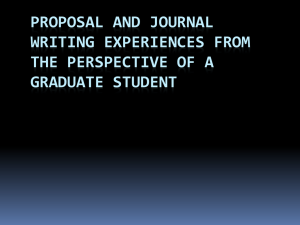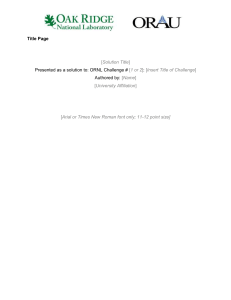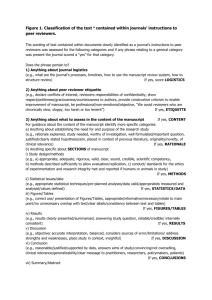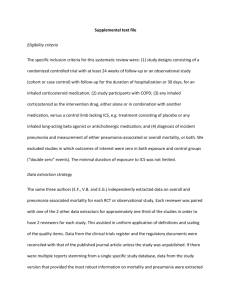METRIC Medical Education Training Research Innovation and
advertisement
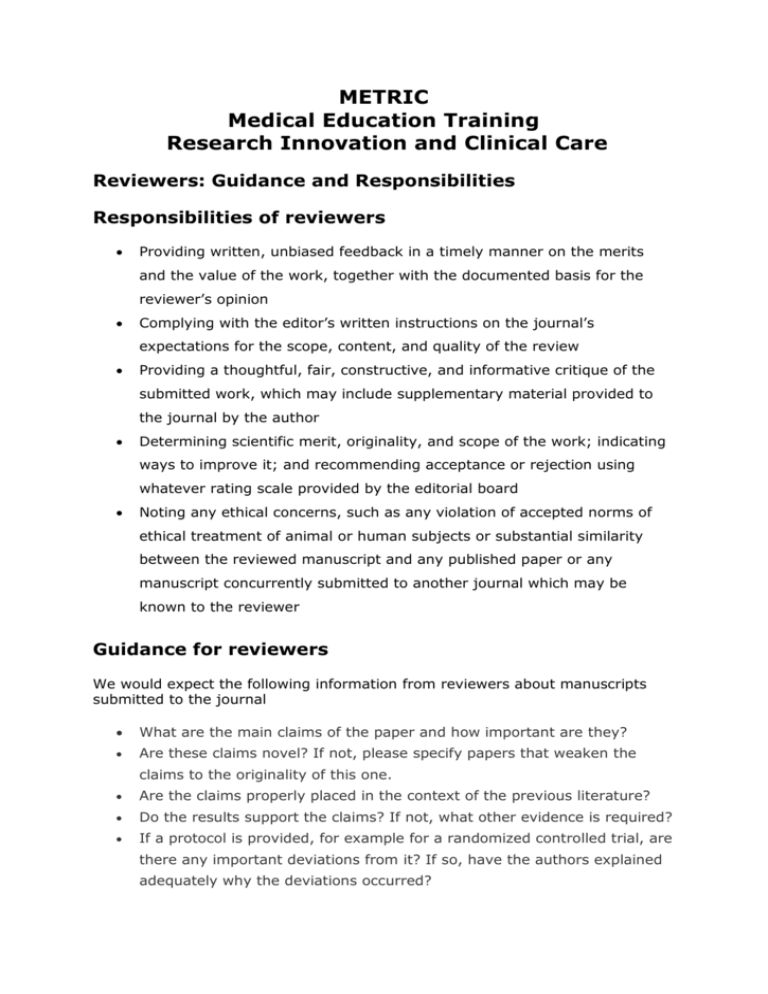
METRIC Medical Education Training Research Innovation and Clinical Care Reviewers: Guidance and Responsibilities Responsibilities of reviewers Providing written, unbiased feedback in a timely manner on the merits and the value of the work, together with the documented basis for the reviewer’s opinion Complying with the editor’s written instructions on the journal’s expectations for the scope, content, and quality of the review Providing a thoughtful, fair, constructive, and informative critique of the submitted work, which may include supplementary material provided to the journal by the author Determining scientific merit, originality, and scope of the work; indicating ways to improve it; and recommending acceptance or rejection using whatever rating scale provided by the editorial board Noting any ethical concerns, such as any violation of accepted norms of ethical treatment of animal or human subjects or substantial similarity between the reviewed manuscript and any published paper or any manuscript concurrently submitted to another journal which may be known to the reviewer Guidance for reviewers We would expect the following information from reviewers about manuscripts submitted to the journal What are the main claims of the paper and how important are they? Are these claims novel? If not, please specify papers that weaken the claims to the originality of this one. Are the claims properly placed in the context of the previous literature? Do the results support the claims? If not, what other evidence is required? If a protocol is provided, for example for a randomized controlled trial, are there any important deviations from it? If so, have the authors explained adequately why the deviations occurred? Would any other experiments or additional information improve the paper? How much better would the paper be if this extra work was done and how difficult would such work be to do, or to provide? Is this paper outstanding in its discipline? (For example, would you like to see this work presented in a seminar at your hospital? Do you feel these results need to be incorporated in your next general lecture on the subject?) If yes, what makes it outstanding? If not, why not? Is this paper of interest to the readership of the Journal audience? If the paper is considered unsuitable for publication in its present form, does the study itself show sufficient enough potential that the authors should be encouraged to resubmit a revised version? In the case of manuscripts deemed worthy of consideration, we would appreciate additional advice from the reviewer on the following: Is the manuscript clearly enough written so that it is understandable to non-specialists? If not, how could it be improved? (Please concentrate on matters of organization and content and not on grammatical or spelling errors that will be corrected by our copyeditor after acceptance.) Have the authors provided adequate proof for their claims without overselling them? Have the authors cited the previous literature appropriately? Does the paper offer enough details of its methodology that its experiments or its analyses could be reproduced? METRIC encourages authors to publish detailed methods as supporting information online. Do any particular methods used in the manuscript warrant such publication? Ethical responsibilities of reviewers Confidentiality Material under review should not be shared or discussed with anyone outside the review process unless necessary and approved by the editor. Material submitted for peer-review is a privileged communication that should be treated in confidence, taking care to guard the author’s identity and work. Because the author may have chosen to exclude some people from this process, no one not directly involved with the manuscript, including colleagues or other experts in the field, should be consulted by the reviewer unless such consultations have first been discussed with the professional editor. Reviewers should not retain copies of submitted manuscripts and should not use the knowledge of their content for any purpose unrelated to the peer review process. If a reviewer is unsure about the policies for enlisting the help of others in the review process, he or she should ask the editor. Constructive critique Reviewer comments should acknowledge positive aspects of the mate rial under review, identify negative aspects constructively, and indicate the improvements needed. The purpose of peer review is not to demonstrate the reviewer’s proficiency in identifying flaws. Reviewers have the responsibility to identify strengths and provide constructive comments to help the author resolve weaknesses in the work. A reviewer should respect the intellectual independence of the author. Anything less leaves the author with no insight into the deficiencies in the submitted work. A reviewer should explain and support his or her judgment clearly enough that reviewers and authors can understand the basis of the comments. The reviewer should ensure that an observation or argument that has been previously reported be accompanied by a relevant citation and should immediately alert the editor when he or she becomes aware of duplicate publication. Although reviews are confidential, all anonymous comments should be courteous and capable of withstanding public scrutiny. Competence Reviewers who realize that their expertise is limited have a responsibility to make their degree of competence clear to the editor. Reviewers need not be expert in every aspect of an article’s content, but they should accept an assignment only if they have adequate expertise to provide an authoritative assessment. A reviewer without the requisite expertise is at risk of recommending acceptance of a submission with substantial deficiencies or rejection of a meritorious paper. In such cases, the reviewer should decline the review and provide the names of potential other reviewers. Impartiality and integrity Reviewer comments and conclusions should be based on an objective and impartial consideration of the facts, exclusive of personal or professional bias. All comments by reviewers should be based solely on the paper’s scientific merit, originality, and quality of writing as well as on the relevance to the journal’s scope and mission, without regard to race, ethnic origin, sex, religion, or citizenship of the authors. A reviewer should not take scientific, financial, personal, or other advantage of material available through the privileged communication of peer review, and every effort should be made to avoid even the appearance of taking advantage of information obtained through the review process. Potential reviewers who are concerned that they have a substantial conflict of interest should decline the request to review and/or discuss their concerns with the editor. Disclosure of conflict of interest To the extent possible, the review system should be designed to minimise actual or perceived bias on the reviewer’s part. If reviewers have any interest that might interfere with an objective review, they should either decline the role of reviewer or disclose the conflict of inte rest to the editor and ask how best to address it. Timeliness and responsiveness Reviewers are responsible for acting promptly, adhering to the instructions for completing a review, and submitting it in a timely manner. Failure to do so undermines the review process. Every effort should be made to complete the review within the time requested. If it is not possible to meet the deadline for the review, then the reviewer should promptly decline to perform the review or should inquire whether some accommodat ion can be made to resolve the problem. Editing Reviewers' Reports The reviewers and METRIC staff do not edit any comments made by reviewers unless the language is deemed inappropriate for professional communication or the comments contain information considered confidential. In their comments to authors, reviewers are encouraged to be honest but not offensive in their language. If an author feels that criticism is unfair, the editor will reserve the right to make a final decision/invite another review. Competing Interests As far as possible we respect requests by authors to exclude reviewers whom they consider to be unsuitable. We also, as much as possible, try to rule out those reviewers who may have an obvious competing interest, such as those who may have been collaborators on other projects with the authors of the manuscript under review, those who may be direct competitors, those who may have a known history of antipathy with the author(s), or those who might profit financially from the work. Because it is not possible for all such competing interests to be known by a particular editor, we request that reviewers who recognize a potential competing interest inform the reviewers or journal staff and excuse themselves if they feel that are unable to offer an impartial review. When submitting your review you must indicate whether or not you have any competing interests. On occasion, reviewers may be asked to offer their opinion on a manuscript that they may have reviewed for other journals. This is not in itself a competing interest. That two journals have identified the same person as especially well qualified to judge the manuscript under consideration does not in any way decrease the validity of that opinion and may perhaps even enhance it. Feedback to Reviewers We send reviewers' comments along with the decision letter to all reviewers of that manuscript. If reviewers have identified themselves, this information will be passed on to other reviewers. Reviewers who may have offered an opinion not in accordance with the final decision should not feel that their recommendation was not duly considered or their service not properly appreciated. Experts often disagree, and it is the job of the editorial team to make a final publication decision.
